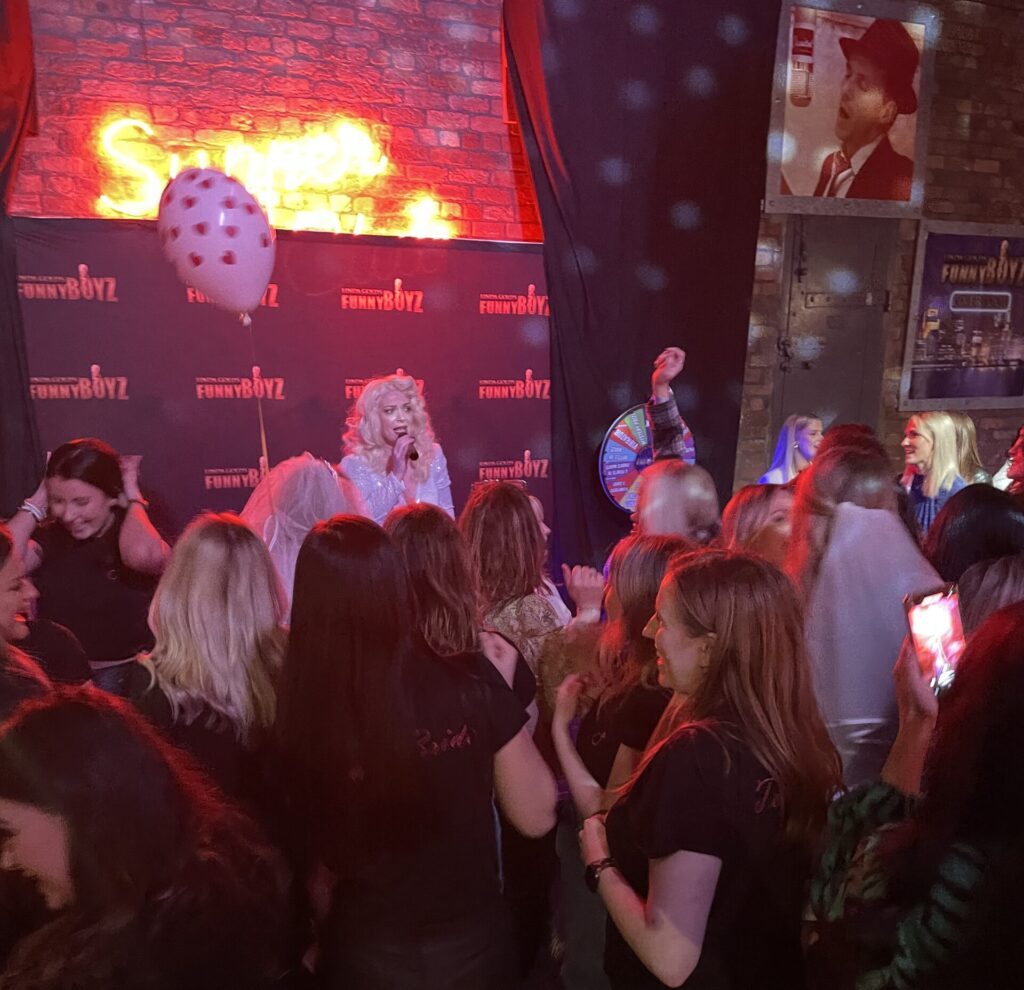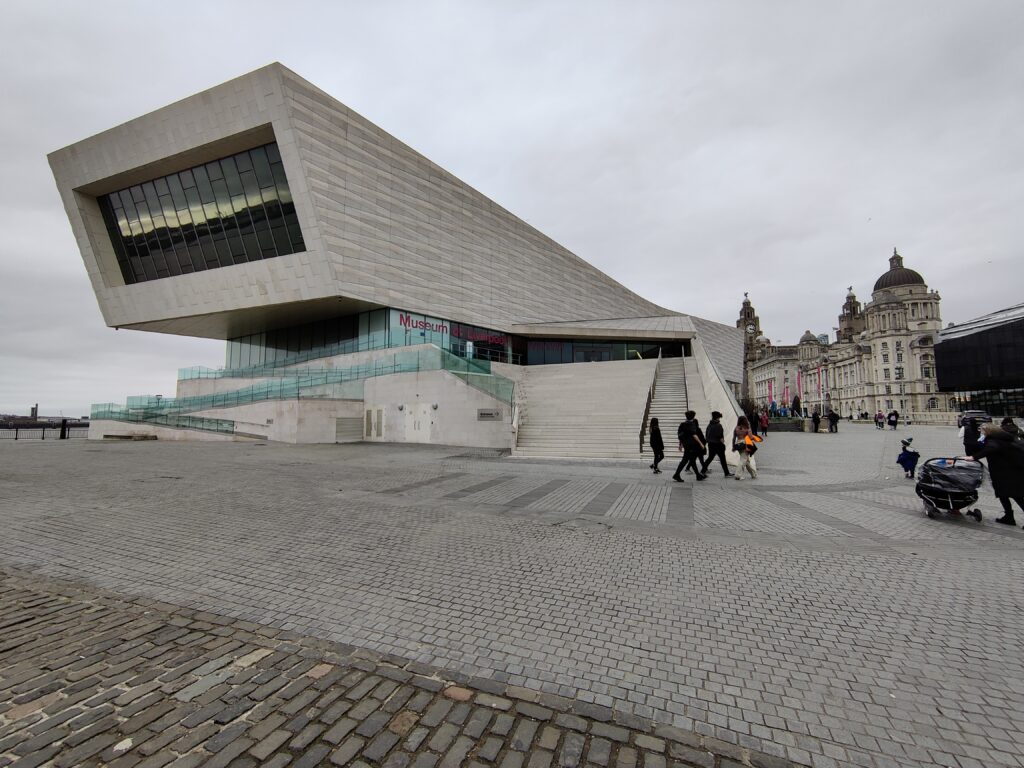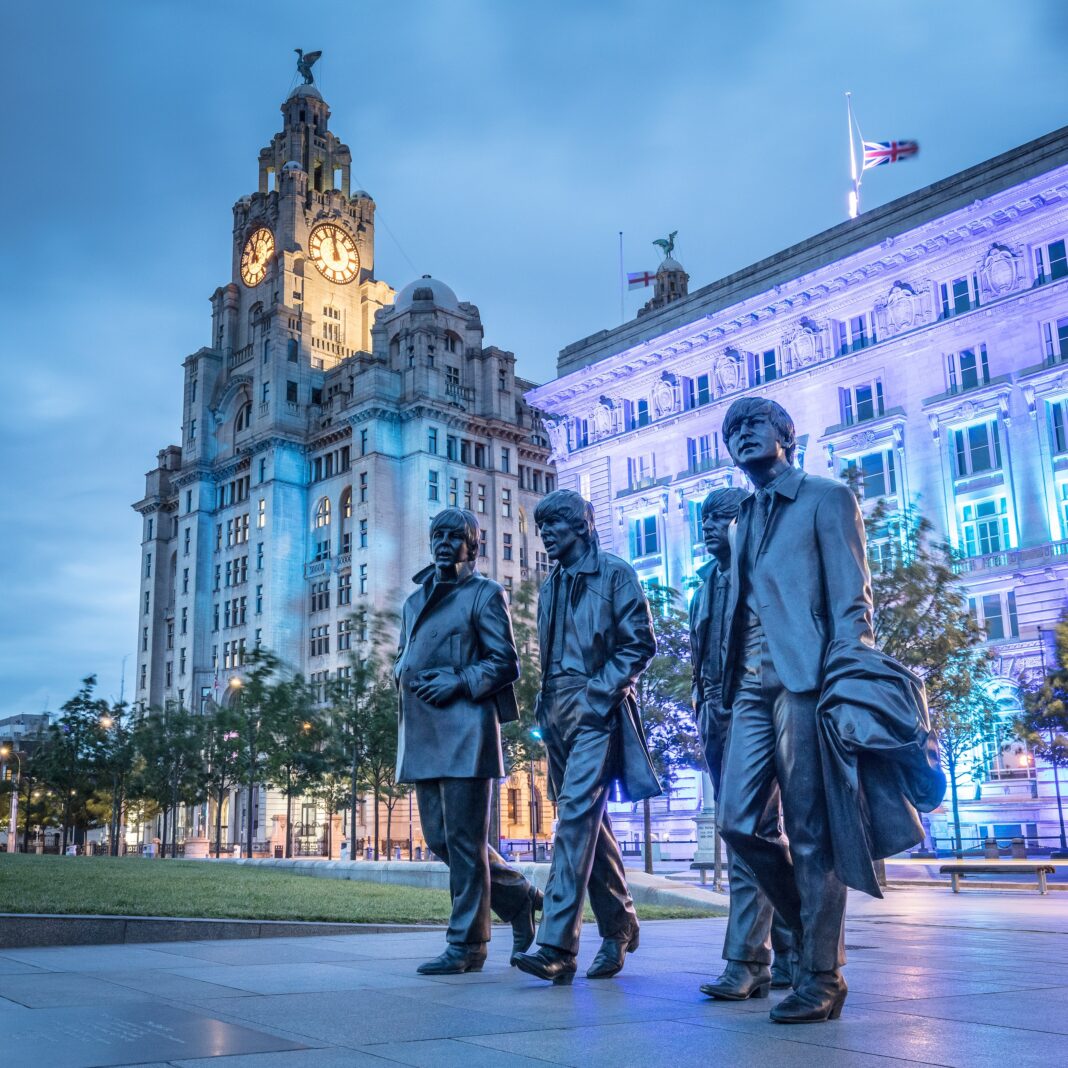Back in the days of Beatlemania, Liverpool saw its share of schoolgirls swooning over John, Paul, George and Ringo. But this spring the U.K. city is bracing itself for another species of swooning invaders: gay Eurovision Song Contest (ESC) fanatics. Armed with an array of national flags, gallons of face glitter and sequined accessories, this over-the-top army will descend on downtown Liverpool from May 9 to May 13, swooning over people with names like Netta, Jamala, Salvador and Conchita. And the city might never be the same again.
“I’ve been watching Eurovision for so long and the fact that it’s coming here—I can’t even grasp it,” says Dys Alexia, a Liverpool-based drag queen who is co-founder of the pan-U.K. drag brunch cabaret empire FunnyBoyz and the EuroDrag competition. “We’re the perfect place to host it. We’ve got the skyline, the stadium. We love music. We’ll have a lot of different cultures all in one place. It’ll be messy, but in a good way.” And a very queer mess at that: of the 200 million people who watch ESC on TV each year, one survey suggests that about 65 percent of them identify as LGBTQ+.

Founded in 1956, ESC has each participating European country (and since 2015, Australia, for some mysterious reason) choose a musical act to represent it in a song-against-song battle. Points are awarded by judges and the public in two semi-finals and then a final round, all held gala-style in a stadium in the host city. A good rule of thumb for victory: the more flamboyant the performance, the more revealing the costumes, the more overwrought the sentiment, the better the chances of winning. Though few ESC winners have crossed over to the mainstream charts—the list thins quickly after ABBA and Céline Dion—fans nurture a cult-like devotion to each year’s competitors and an obsession over the vast amount of trivia that’s built up around the competition.
The victorious country each year usually hosts the following year, but when Ukraine’s Kalush Orchestra won last year in Turin, Italy, for the song “Stefania,” it quickly became clear that, because of the Russian invasion, the band’s home country would not be in a position to host in 2023. (Russia is currently banned from the competition.) Liverpool made a bid (one of 20 U.K. cities to do so) to be substitute host and won the honour, a first for the city. In fact, it’s the first time in 25 years a U.K. city has hosted; Britain, to the consternation of its large and influential popular music industry, rarely does well at ESC.
Liverpool has been waiting for something like this for a long time. In fact, based on the chats I had with people during a February visit, its citizens are Olympic-level thrilled that they’ll get to party with the tens of thousands of fans who are expected to visit for ESC. And those visitors might be surprised at what they find in Merseyside. (That’s the name for the greater metropolitan area, defined by the Mersey River, which has a population of almost 1.5 million.)
Liverpool has spent the last few decades transforming itself from an industrial port city—severely damaged by the Second World War, then hollowed out by waves of deindustrialization starting in the 1970s—into a modern leisure destination. Parking lots have been filled in with stylish shopping centres, neighbourhoods of garages and warehouses have been sprinkled with brewpubs and artist-run centres. Serious European soccer fans are already in on the secret, when the away-team travellers arrive en masse for football party weekends for games with Liverpool FC. The wide range of bars, clubs and assorted entertainment venues in the compact city centre (including an adorable and bustling Pride Quarter on and around Stanley Street—see the listings below) have become focal points for throngs of young people on weekends. Bridal parties from across the U.K. are endlessly staggering around the streets of the Cavern Quarter, and the clubs of Seele and Hardman streets, partly because the city is considered safe enough and easy enough to navigate for partiers to throw caution to the wind. Drag has become part of the city’s identity. Two of the four winners of RuPaul’s Drag Race U.K., The Vivienne and Danny Beard, grew up here.

But it’s not just about the nightlife. Liverpool’s Royal Albert Dock, which is a key stop for cruise ships as well as weekend visitors, is awash in attractions ranging from Tate Liverpool to The Beatles Story museum. Even beyond The Beatles, which, to be honest, are unavoidable in Liverpool, music is key to the contemporary Merseyside identity. In the 1980s, the city produced ahead-of-their-time queer acts like Frankie Goes to Hollywood and Dead or Alive, then later Mel C of the Spice Girls and more recently dancefloor delights like CamelPhat. Worshippers at the feet of artistic talent have a lot of artifacts to pray to. The collection of the British Music Experience museum, for example, includes some of the more flamboyant outfits of David Bowie, Elton John, Dusty Springfield and Boy George, while the enthusiastically hometown-proud Museum of Liverpool salutes homegrown pop-culture divas like Sex and the City’s Kim Cattrall and Killing Eve’s Jodie Comer. ESC will tie the city to yet another stream of pop culture—perhaps, say, Gustaph from Belgium, Blanca Paloma from Spain or Theodor Andrei from Romania will form a special connection to the city while each of them competes.
“It’s going to be absolutely huge,” drag queen Linda Gold, the other co-founder of FunnyBoyz and creator of Drag Idol Sweden, tells me. “It will definitely make a difference to the Europeans because they very much follow Eurovision more than we do in the U.K. I lived in Sweden for six years and in Sweden, it is like Christmas Day, it’s the most important day of the year. They are now going to come to the U.K. and instead of coming to London, they’ll come to Liverpool. Some of these people have barely heard of the city other than the fact that we have a football team and we have The Beatles—that is, we had The Beatles 60 years ago.”
While Liverpool Stadium has a capacity of 54,000 people, the thrill of ESC is not just for ticket holders. Much of the fun of Liverpool’s ESC will be at an outdoor waterfront festival, at the Eurovision Village, which will have big screens broadcasting what’s happening inside the stadium, and parties at bars, clubs and other cultural institutions. Looking at the Instagram pages of Liverpool entertainment and cultural venues, it seems there’s no one sitting this one out.
“We expect that to be a buzz in the city. With this being a city of music, it makes sense that Eurovision will have a huge impact here,” says Mason Griffiths, marketing and PR executive at The Beatles Story, which will also be hosting events. Many of the city-wide activations will also signal solidarity and support for Ukraine.
No matter who takes home the prize for ESC 2023, the city itself is bound to be the biggest winner, showing the world—or at least, the world that cares about Eurovision—that it’s just as relevant and just as passionate as it’s ever been.
Read our Insider’s Guide to Liverpool here.
Editor’s note: The cost of the writer’s trip to Liverpool was covered by VisitBritain. The sponsors of the trip did not direct or review coverage. The views expressed are the writer’s own.


